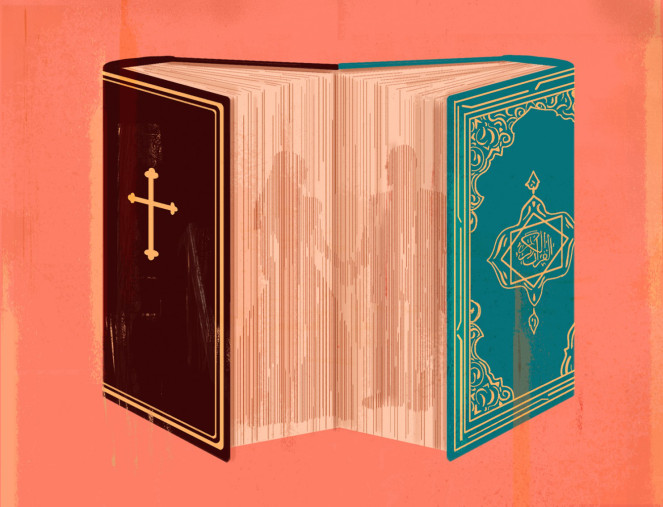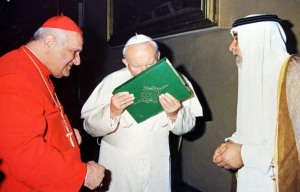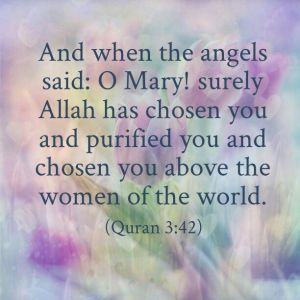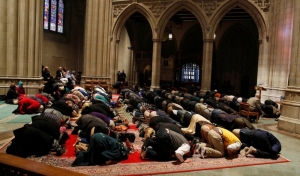By Dr Craig Considine, a Roman Catholic academic. He makes many good points, but he makes a few incorrect statements about Islamic practice.

The Bible and Qur’an. Courtesy of The Washington Post.
Since he took his position as the Holy Father in 2013, Pope Francis has consistently encouraged Catholics to engage with Muslims as a means to build bridges of interfaith understanding. His call, however, appears to have fallen on deaf ears. According to a 2016 study by The Bridge Initiative at Georgetown University, only 14% of American Catholics have a favorable view of Muslims. This troubling figure suggests that the gap between Muslims and Catholics is widening in the United States. While there are certainly theological differences between the two religions, there are also important areas of belief and practice that are shared by Muslims and Catholics.
Monotheism
At a basic level, Muslims and Catholics are monotheists, or people who share belief in the notion of one God. Alongside Judaism, Islam and Catholicism have their theological and spiritual roots in Genesis, the first part of the Old Testament which shares the story of Abraham, the founder of monotheism.
Pope Francis touched upon Abraham during a March 2013 interfaith event. In front of many world leaders, the Pope stated that Muslims “worship the one living and merciful God, and call upon him in prayer.” Indeed, every year, Muslims revere Abraham during Eid-ul-Adha, a commemoration of his supreme offering of his own son, Ismail, to God.

One of Pope Francis’s role models, Pope John Paul II, also affirmed the Abrahamic links between Islam and Catholicism. Speaking on August 19, 1985 to young Muslims in Morocco, John Paul II stated, “Christians and Muslims, we have many things in common, as believers and as human beings. […] For us Abraham is a very model of faith in God, of submission to his will and of confidence in his goodness.”
Reverence for Jesus and Mary
Muslims and Catholics see Jesus as someone who performed miracles. Both groups consider him to be the Messiah. According to the Qur’an, Jesus was born miraculously through God’s spirit to the Virgin Mary, without having an earthly father. The Qur’an considers Jesus to be holy, sinless, perfect, and sanctified. Muslims are also told to believe that Jesus will return near the end of time to usher in a team of peace by defeating the anti-Christ.
Reverence for Mary, Jesus’s mother, is another commonality between Islam and Catholicism. Catholics may be surprised to learn of the respect that the Qur’an gives to Mary, who has a chapter, “Surrah Maryam,” named after her. She is mentioned in the Islamic holy book a total of thirty-four times, more than the number of her mentions in the Gospel.
 Mary is considered to be a righteous woman among Muslims. When the Archangel Gabriel visited her, she asked, “How shall I have a son, seeing that no man has touched me, and I am not unchaste?” (Qur’an 19:16-21). Gabriel responded: “So (it will be). Your God says, ‘That is easy for Me, and [We wish] to appoint him as a Sign unto men, and a Mercy from Us.’” Moreover, according to the Qur’an (21:91), God breathed into Mary His spirit, and made her and Jesus a blessing for all peoples.
Mary is considered to be a righteous woman among Muslims. When the Archangel Gabriel visited her, she asked, “How shall I have a son, seeing that no man has touched me, and I am not unchaste?” (Qur’an 19:16-21). Gabriel responded: “So (it will be). Your God says, ‘That is easy for Me, and [We wish] to appoint him as a Sign unto men, and a Mercy from Us.’” Moreover, according to the Qur’an (21:91), God breathed into Mary His spirit, and made her and Jesus a blessing for all peoples.
Similarly, in Catholicism, Mary is the mother of God and the greatest of all saints. The New Testament explains her miraculous birth. In Luke (1:34-35), she said to Gabriel, “How will this be since I am a virgin?” Gabriel responded: “The Holy Spirit will come upon you, and the power of the Most High will overshadow you; therefore the child to be born will be called holy – the Son of God.”
Pilgrimage
To obtain favor from God, Muslims and Catholics are also encouraged to participate in pilgrimages. The last of the Five Pillars of Islam asks Muslims to perform hajj, the spiritual journey to the city of Mecca, Saudi Arabia, at least once in a lifetime if they are physically and financially able.
The hajj reminds Muslims that they belong to an ummah, a global community which spans across the world. Malcolm X, the U.S. Civil Rights leaders, described the hajj as a monumental and life changing experience. He stated: “Never have I witnessed such sincere hospitality and overwhelming spirit of true brotherhood as is practiced by people of all colors and races here in this ancient Holy Land, the home of Abraham, Muhammad and all the other Prophets of the Holy Scripture.”
On the other hand, in Catholicism, there is no official “pillar” calling on Catholics to participate in pilgrimage. However, Catholics regularly visit several holy sites around the world including Fatima, Lourdes, and the Holy Land of modern-day Israel. Catholics also visit Vatican City and the Church of Saint Peter in Rome, the heart of global Catholicism. Anna Santo, the Holy Year which is celebrated every twenty-five years, is a popular pilgrimage time for Catholics.
Intercessors
Muslims and Catholics use intercessors to connect with God. Although intercession is a contentious contemporary issue for Muslims, Sufis practice the seeking of intercession through saints. Muslims who participate in tawassul, the Islamic concept for intercession, believe that they are drawing closer to God. Tawassul also points to a hadith, or saying of Prophet Muhammad, in which a Muslim is told that he could seek intercession through Muhammad to cure him of his blindness.
In contrast to Islam, intercession is an officially accepted religious practice by the Catholic Church. Catholics who use intercession pray to saints in the hope that they can obtain blessings from them on behalf of God.
Praying

Prayer is an important daily feature in the lives of practicing Muslims and Catholics. Both groups are called on to pray as an act of obedience to God. Salah, the Islamic prayer, is one of the Five Pillars of Islam which calls on Muslims to pray five times each day. Catholics, on the other hand, participate in the Eucharist, or the Holy Communion of the Lord’s Supper. This prayer is a remembrance to Jesus’s offering his body and blood for the sins of mankind. The Mass of the Eucharist mirrors the five daily prayers of Islam. During Mass, Catholics are asked to offer each other the sign of peace by extending their hand and warmly greeting their neighbor. This peaceful greeting is similar to the Muslim greeting of assalamalikum, or “peace be with you” in Arabic, which can also be offered with a handshake.
Charity
Muslims and Catholics practice and preach the importance of charity and alms giving. One of the Five Pillars of Islam, zakat, is an obligation upon every Muslim to donate a portion of their wealth to the poor and needy. One of the purposes of zakatis for the wealthier members of society to give to those who truly need it, which in-turn redistributes wealth as a way to counteract social inequality.
In Catholicism, charity is an important obligation. According to Saint Paul in Corinthians (13:13), “the greatest of these [faith, hope, and charity] is charity.” Catholics are encouraged to give a certain percentage of their income to the Church or other Catholic-run charitable causes. Indeed, in light of the teachings of Jesus, the goods of the Earth are meant to be shared by all human beings, not just for the more fortunate and wealthy members of society.
Fasting
Muslims and Catholics fast as a means to nourish the soul and give thanks to God’s bountiful offerings. Fasting is one of the Five Pillars of Islam. During Ramadan, the 9th month of the Islamic lunar calendar, Muslims fast from dawn until sundown and abstain from sexual activity, anger, fighting, and addiction to resist bodily pleasures and harmful thoughts. When the fast is broken at night, Muslims come together, generally at a mosque, for a feast.
For Catholics, fasting is a form of penance to make amends for sins. Each year, Catholics are encouraged to fast and repent for forty days during Lent. On Ash Wednesday and all Fridays during Lent, Catholics are supposed to refrain from eating meat.
Conclusion
These commonalities between Islam and Catholicism can serve as a tool to build bridges between Muslims and Catholics. Peace between these groups is possible through dialogue and the investigation of the foundations of Islam and Catholicism, which have been outlined in this piece.
Categories: Bible, Catholicism, Islam, Quran
Dr Craig Considine makes many good points, but makes a few incorrect statements about Islamic practice. He writes:
‘Muslims and Catholics use intercessors to connect with God. Although intercession is a contentious contemporary issue for Muslims, Sufis practice the seeking of intercession through saints. Muslims who participate in tawassul, the Islamic concept for intercession, believe that they are drawing closer to God. Tawassul also points to a hadith, or saying of Prophet Muhammad, in which a Muslim is told that he could seek intercession through Muhammad to cure him of his blindness.’
1) Muslim do NOT use intercessors to connect to God! We pray directly to Him!
2) Tawassul is NOT the Islamic concept for intercession! Tawassul are spiritual practices that obtain nearness to God.
3) ‘a hadith..in which a Muslim is told that he could seek intercession through Muhammad to cure him of his blindness.’
Which hadith is this? It is customary to cite the reference (who recorded it, from which hadith collection it comes from etc) for a hadith one cites as there are many forgeries in existence.
LikeLiked by 1 person
Another example might be the Islamic concept of the punishments in the grave some endure between death and resurrection resembling Purgatory, somewhat.
Still another example might be various instances where there is a story found in both the Qur’an and the Bible, and the Qur’anic text is closer to how some Catholics interpret the relevant Biblical text than what is explicit in the Biblical text (one example I like: surat Al `Imran 3:42 parallels Luke 1:28; some Catholics have interpreted the Lucan text as alluding to Mary’s purification, something seemingly more explicit in the apparent Qur’anic parallel).
LikeLike
Sir, Peace be upon you, I hope you well. Sir I enjoyed your article on the nativity of Jesus. Could you please produce a similarly or more detailed on the Biblical basis of the Trinity and why it Trumps the Unitaran interpretation. I want to see the full pleothra of Biblical proofs, so the doubts are destroyed. Even if the article is not very detailed, at least present the most explicit Trinitarian verses or those that establish/hint the Deity of Khrist.
LikeLike
Greetings Seeker.
I appreciate the suggestion/request, though I’m not sure when I would post such. My time is a bit limited, but these days I have a bunch other, perhaps more light hearted ideas for future contributions to this blog (such as maybe a piece comparing variants of the Shema` and the Lord’s Prayer, or a piece on the difference between having a seat at the table and being treated like a dog in the NT and Zohar, or a piece on the Biblical Adam and the genus Homo, et cetera…). I have considered possibly doing a piece on Dyiphysitism.
The Trinity in the Bible, though? We’ll see…
LikeLike
Thanks for responding Sir. I do think that the Nature of God, the Identity of God, the Truth about God are the most important concepts since Salvation depends upon it according to the 3 Monotheistic Faiths. The Qur’an explicitly condemns idolaters , polytheists and creations worshipers to Hell and Christians are in that category according to Islamic consensus. And the NT says :
24 God is Spirit, and those who worship Him MUST WORSHIP HIM IN SPIRIT AND TRUTH .”
So John is explicitly saying we need to Worship God, and Worship God in Truth. It is difficult to worship God in Truth, when you have no idea whether there is 1 God or 2 Gods or 1 God in 3 etc etc and are confused. Monotheism is the central pillar of the OT and of Jesus in the NT and of the NT writers. And Monotheism is the Most Central Pillar of Islam. And having the wrong monotheism or no monotheism is being in serious trouble. Traditional Church Position is that Non-Trinitarians are not saved and not Christians. The Islamic and Jewish position is the exact opposite. This is the most important stuff. And John 4: 24 puts heavy emphasis in knowing the Truth about God as does the OT and especially Jesus.
But Jesus replied, “It is written: ‘Worship the Lord your God and serve Him only.'”
Luke 4:8
28 Now one of the scribes had come up and heard their debate. Noticing how well Jesus had answered them, he asked Him, “Which commandment is the most important of all?” 29 Jesus replied, “This is the most important: ‘Hear O Israel, the Lord our God is One Lord, 30 and you shall love the Lord your God with all your heart and with all your soul and with all your mind and with all your strength.’
So obviously it is quite clear that NO 1 Knowing God and Worshiping Him Alone is very important in Judaism/Jesus/NT/Islam. Yet there is much confusion about this etc. I would say knowing God and the Truth about is clearly the most important thing.
LikeLike
“1) Muslim do NOT use intercessors to connect to God! We pray directly to Him! ”
He’s right, islamic angels intercess for Muslims:
40 v 7. Those who carry the Throne, and those around it, glorify their Lord with praise, and believe in Him, and ask for forgiveness for those who believe: “Our Lord, You have encompassed everything in mercy and knowledge; so forgive those who repent and follow Your path, and protect them from the agony of the Blaze.
42 v 5. The heavens above them almost burst apart, while the angels glorify the praises of their Lord, and ask forgiveness for those on earth. God is indeed the Forgiver, the Merciful.
They even tell Allah what to do. Go figure that out!
LikeLike
“They even tell Allah what to do. Go figure that out!”
“Asking” and “telling” are two different things.
Also Muslims do not pray to saints nor to angels for intercession. Whereas Catholics pray to saints asking for intercession, Muslims pray directly only to Allah (swt), and no one else.
LikeLiked by 1 person
Erasmus
Have you ever seen a Muslim praying to an angel for intercession? Bring your proof. Without your any proof from you, then consider your argument false.
Paul Williams wrote this;
1) Muslim do NOT use intercessors to connect to God! We pray directly to Him!
Yes, PW is right because no, we do not use intercessors do not use intercessors to connect to God! We pray directly to God. If an angel or someone who in concern about you and prays to God for you, that is n normal and it does not mean, you prayed to the angel or that person to pray for you to connect to God.
God said Muslims must pray to Him directly and connect to him. There is nothing wrong if your relation, angel or any person praying for you in addition. The intercession and or connection is done by us ourselves as Muslims.
Prayers to God by others is just addition and not intercession.
Thanks.
LikeLiked by 1 person
”
40 v 7. Those who carry the Throne, and those around it, glorify their Lord with praise, and believe in Him, and ask for forgiveness for those who believe: “Our Lord, You have encompassed everything in mercy and knowledge; so forgive those who repent and follow Your path, and protect them from the agony of the Blaze.
42 v 5. The heavens above them almost burst apart, while the angels glorify the praises of their Lord, and ask forgiveness for those on earth. God is indeed the Forgiver, the Merciful.
They even tell Allah what to do.”
. in semitic languages their is something called the COMMAND verb in which one is telling God to guide and keep one from falling into sin. hebrew prophets also used “save us from danger”
“guide us”
i guess they were telling god what to do, right?
i guess when you say “lead us not into temptation”
you are telling your lard what to do, right?
“father forgive them…”
put that in hebrew and we see that one is telling god what to do, according to your understanding. .
”
islamic angels intercess for Muslims:”
“those who repent…”
the condition is to forgive those who repent to God. does it say repent THROUGH angels?
they out of kindness , love and charity are asking God to forgive. they don’t seem to be playing role of intermediary in the verses you quoted. they are not ones who are doing this
http://corpus.quran.com/qurandictionary.jsp?q=$fE#(39:43:6)
LikeLike
Another holy spirit fail for Ignoramus!
Angels pray and intercede for Muslims by Allah’s permission. But Muslims do not pray to angels to intercede for them. Get the difference? I know it’s hard for you to think because of the corrupting influence of your holy spirit, but try anyway.
LikeLiked by 2 people
“Angels pray and intercede for Muslims by Allah’s permission. But Muslims do not pray to angels to intercede for them”
bro faiz, but notice in that specific verse erasmus quoted, does not have the angels acting as intermediaries.
i think english language messes things up but maybe eric kissam can explain difference between MUSTAGFIR and mustashfi3
surely they do not mean the same thing even if they have few similarities.
LikeLike
In Arabic, the فعل امر can be used for, among other things, commanding OR requesting. Nice try.
LikeLiked by 1 person